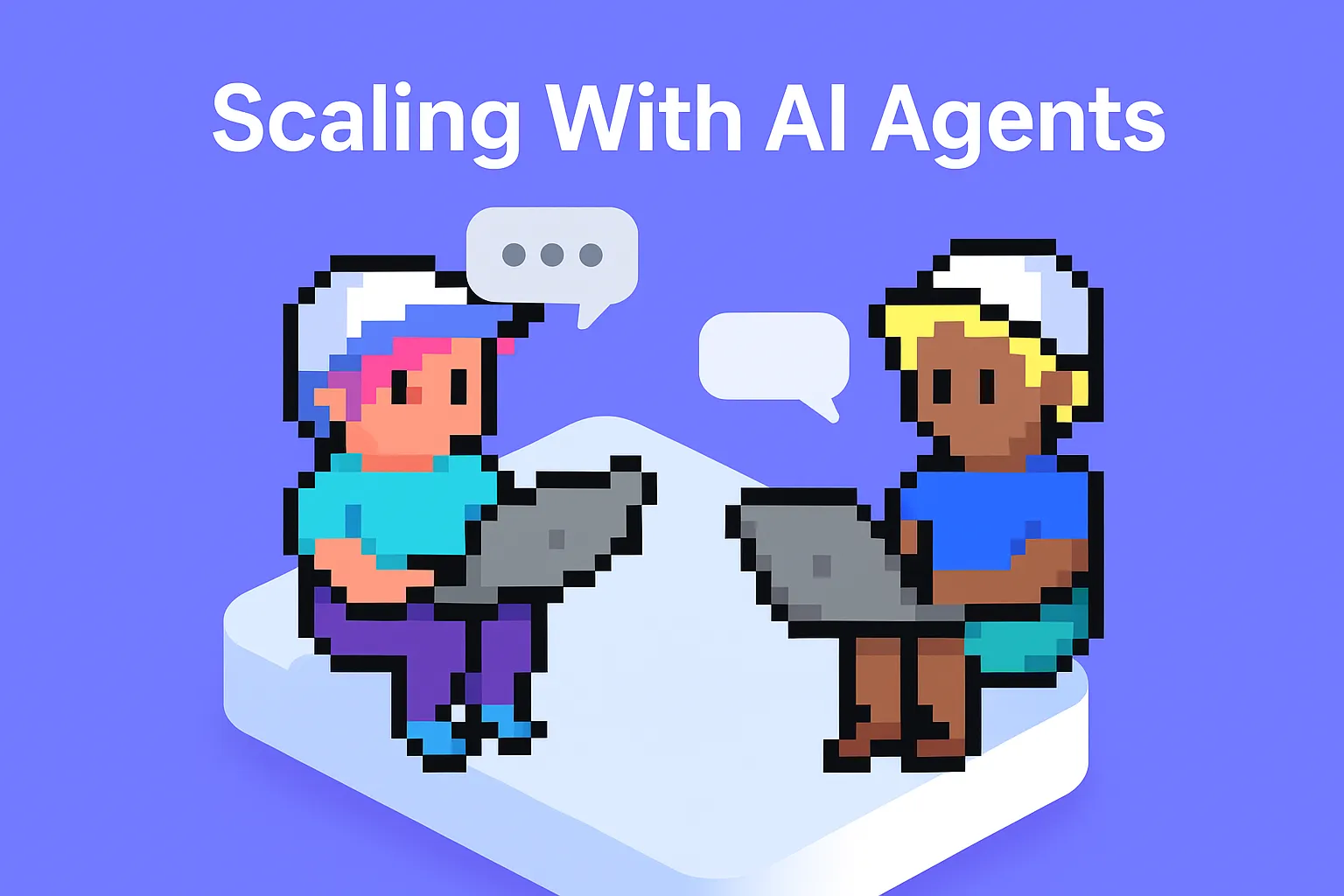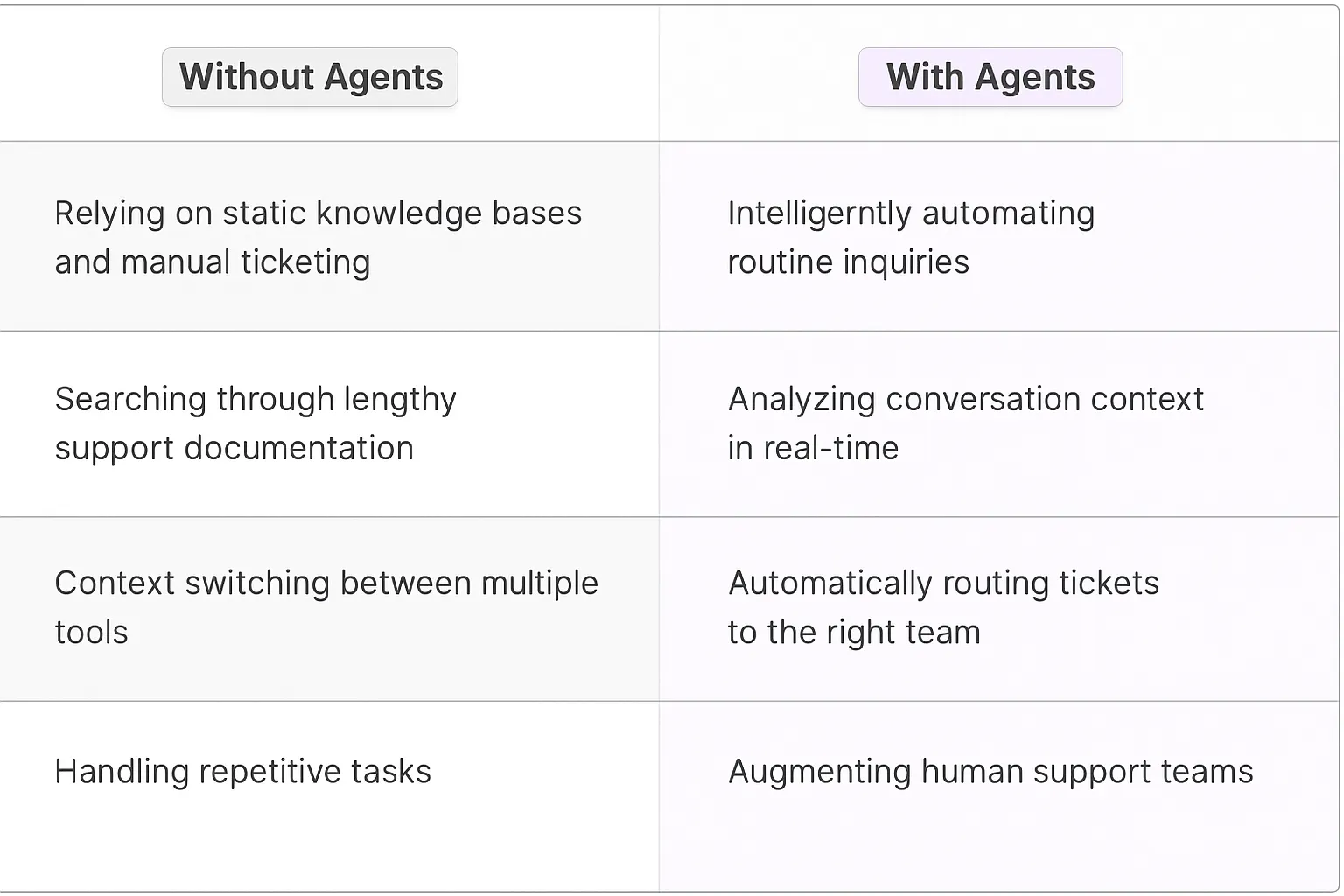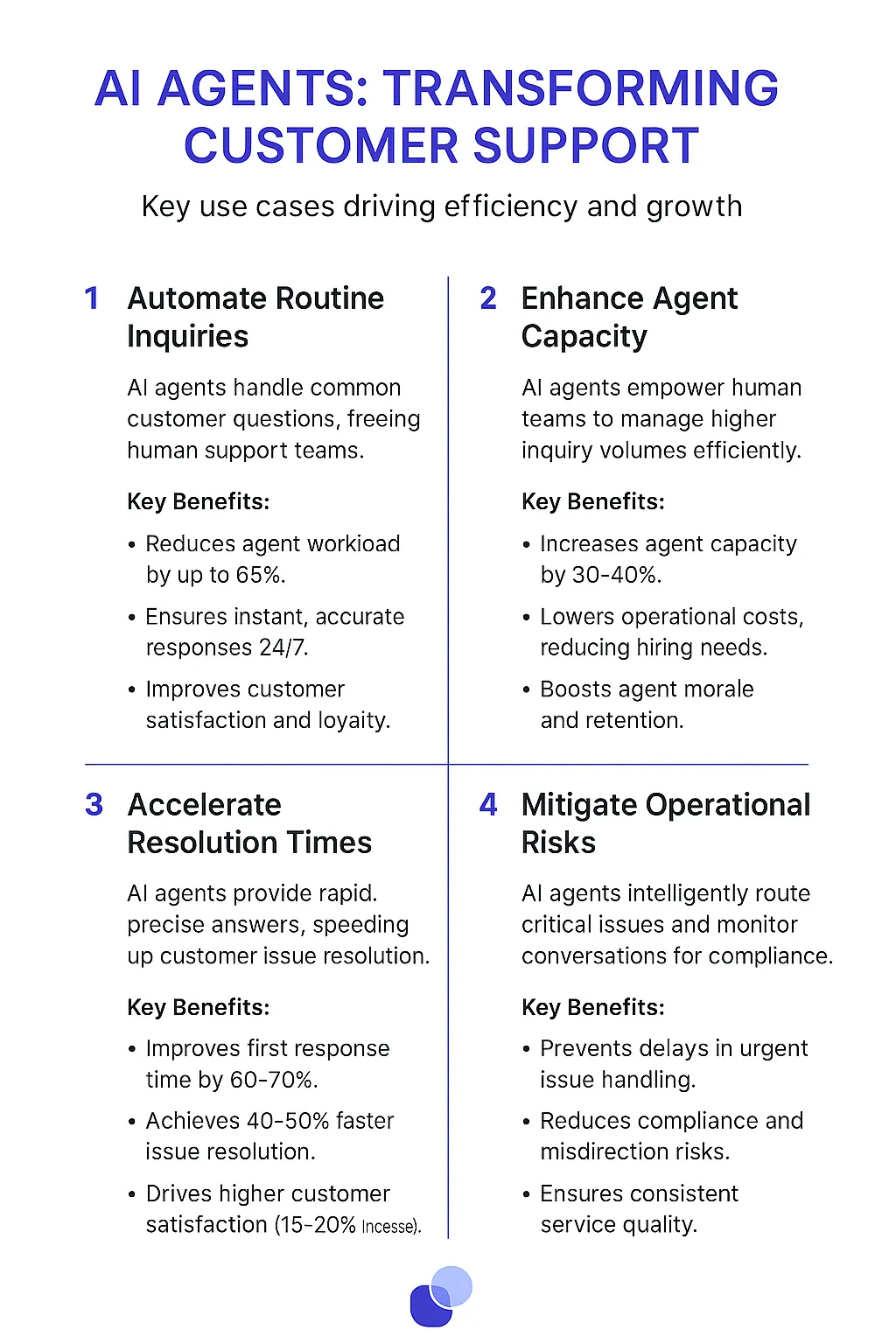Dixa
Understanding Dixa's Customer Engagement Platform
Dixa stands as a customer engagement platform that merges advanced AI capabilities with human expertise. The platform unifies customer interactions across multiple channels while providing intelligent routing and automated support features. Unlike traditional helpdesk solutions, Dixa's architecture enables seamless transitions between AI and human agents, creating a unified customer experience regardless of the interaction point.
The platform's core strengths include:- Real-time conversation analysis and routing- Intelligent knowledge base integration- Automated ticket classification and prioritization- Multi-language support capabilities- Advanced analytics and performance tracking- Seamless channel switching without losing context- AI-powered response suggestions- Customizable workflow automation

Benefits of AI Agents for Dixa
What would have been used before AI Agents?
Customer service teams using Dixa previously relied on static knowledge bases, basic routing rules, and manual ticket classification. Support agents spent countless hours searching through documentation, categorizing tickets, and handling repetitive inquiries that could have been automated. The cognitive load on agents was intense - they had to context switch between multiple tools while maintaining conversation quality and speed.
What are the benefits of AI Agents?
AI Agents transform Dixa's customer service capabilities through intelligent automation that actually delivers meaningful results. The agents analyze conversation context and customer history in real-time, automatically routing inquiries to the right team members based on expertise and availability.
The most impactful benefit is how AI Agents augment human support teams rather than replacing them. They handle the heavy lifting of ticket classification, knowledge retrieval, and response drafting - but in a way that enhances rather than constrains human judgment. Support staff can focus their cognitive resources on complex problem-solving and building genuine customer relationships.
From a metrics perspective, AI Agents drive substantial improvements in key support KPIs:- First response times drop by 60-70% through instant automated triage- Resolution times improve by 40-50% with AI-powered knowledge suggestions- Agent capacity increases by 30-40% by offloading routine tasks- Customer satisfaction scores rise 15-20% due to faster, more accurate support
The network effects are particularly compelling - as more conversations flow through the system, the AI Agents become increasingly adept at pattern recognition and response optimization. This creates a powerful flywheel where improved automation leads to better customer experiences which drives increased usage.
For growing support teams, AI Agents also dramatically reduce new agent onboarding time. Digital teammates handle much of the initial knowledge transfer, allowing human agents to ramp up productivity 2-3x faster than traditional training approaches.

Potential Use Cases of AI Agents with Dixa
Processes
- Automated ticket routing based on customer sentiment and issue complexity, directing urgent matters to senior support staff while handling routine inquiries independently
- Real-time language translation for global customer support teams, enabling seamless communication across 100+ languages
- Proactive customer outreach during critical service events, maintaining clear communication channels when issues arise
- Knowledge base optimization through continuous analysis of customer interactions and support ticket resolutions
Tasks
- Instant response generation for common customer inquiries, incorporating previous interaction context and customer history
- Data extraction from customer conversations to populate CRM fields and update customer records automatically
- Quality assurance monitoring of support conversations, flagging interactions that need supervisor review
- Customer satisfaction prediction based on conversation patterns and response times
- Automated meeting summaries from customer calls with action items and follow-up tasks
Advanced Implementation Strategies
The most effective Dixa AI implementations focus on augmenting human capabilities rather than replacing them. Support teams using AI-powered workflows see 3-4x improvements in response times while maintaining high customer satisfaction scores.
Digital teammates integrated with Dixa excel at pattern recognition across thousands of customer interactions. They identify trending issues before they become widespread problems and suggest proactive solutions to support teams.
Smart routing capabilities ensure customers connect with the right support tier immediately. The AI analyzes message content, customer history, and current support team capacity to make intelligent routing decisions in milliseconds.
Impact Metrics
Support teams leveraging Dixa's AI capabilities typically experience:
- 40-60% reduction in average handle time for routine inquiries
- 85% accuracy in automated response suggestions
- 30% decrease in escalations to senior support staff
- 2x increase in first-contact resolution rates
- 50% reduction in time spent on data entry and administrative tasks
These metrics demonstrate how AI integration transforms support operations from reactive to proactive, creating space for meaningful customer interactions while handling routine tasks efficiently.

Industry Use Cases
Dixa's AI agents are transforming how businesses handle customer interactions across multiple sectors. The technology adapts to specific industry needs, creating meaningful connections between companies and their customers. From retail to financial services, these digital teammates integrate seamlessly into existing operations while bringing new capabilities to teams.
What makes Dixa's approach particularly compelling is how it moves beyond basic automation. The AI analyzes conversation patterns, customer sentiment, and historical data to provide contextually relevant support. This depth of understanding means retail brands can offer personalized shopping guidance, while SaaS companies can deliver technical support that feels natural and informed.
The real power lies in Dixa's ability to learn and evolve with each interaction. Unlike static systems, these AI agents build institutional knowledge over time, becoming more valuable as they handle increasingly complex scenarios. This progressive learning creates a compounding effect - the more a business uses Dixa, the more refined and industry-specific its responses become.
E-commerce Industry: Scaling Customer Support with Dixa AI
E-commerce businesses face massive spikes in customer inquiries during peak shopping seasons, often overwhelming traditional support teams. A mid-sized fashion retailer processing 50,000 orders monthly typically sees their support volume triple during Black Friday and holiday seasons. This creates a critical breaking point for customer satisfaction.
Dixa AI agents transform this dynamic by intelligently handling the surge in customer conversations. When integrated into an e-commerce support workflow, the AI can process order status checks, initiate returns, and provide detailed product information - tasks that traditionally consume 65% of support agents' time.
The real power emerges in how Dixa AI adapts to customer context. When a shopper asks about a delayed package, the AI instantly accesses order history, shipping data, and previous interactions to provide precise, personalized responses. This deep context awareness means customers receive accurate information without repeating themselves across multiple channels.
For example, when ASOS-style fashion retailers implement Dixa AI, they typically see:
- Response times dropping from 12 minutes to under 30 seconds
- First-contact resolution rates improving by 40%
- Support teams handling 3x more inquiries without adding headcount
- Customer satisfaction scores increasing by 25% during peak seasons
The key differentiator is Dixa AI's ability to maintain high-quality interactions even as conversation volume scales. Unlike basic chatbots, it learns from each interaction, building a deeper understanding of product catalogs, customer preferences, and common resolution paths. This creates a compounding effect where support quality actually improves with scale.
Healthcare Industry: Transforming Patient Support Through Dixa AI
Healthcare providers face unique challenges in managing patient communications while maintaining HIPAA compliance and delivering empathetic care. A typical regional healthcare network handles over 200,000 patient interactions monthly across appointment scheduling, prescription refills, and care follow-ups - with 40% occurring outside normal business hours.
Dixa AI agents excel in this environment by combining secure, compliant communication with intelligent triage capabilities. The system recognizes patient intent patterns and routes urgent medical concerns to on-call staff while handling routine administrative tasks autonomously.
When integrated into healthcare workflows, Dixa AI processes appointment scheduling, insurance verification, and prescription refill requests - tasks that traditionally consume 70% of front desk staff time. The AI maintains detailed conversation context while operating within strict privacy guidelines.
A major healthcare network implementing Dixa AI typically experiences:
- Patient wait times reduced from 18 minutes to 45 seconds
- Administrative staff capacity increased by 60%
- After-hours response coverage improved to 98%
- Patient satisfaction scores elevated by 35%
The system's ability to learn from each interaction creates compound benefits. It builds sophisticated understanding of common patient needs, medication schedules, and appointment patterns. This learning enables proactive outreach for preventive care and follow-ups.
Most significantly, Dixa AI maintains the human element in healthcare communication. When patients message about sensitive health concerns, the AI recognizes emotional context and adjusts its tone accordingly. It knows when to provide direct information versus when to route conversations to clinical staff.
The platform's impact extends beyond efficiency metrics - it fundamentally improves access to care. Patients receive faster responses to health questions, easier access to appointments, and more consistent follow-up care. This comprehensive support system helps healthcare providers deliver better patient outcomes while managing growing demand for services.
Considerations and Challenges
Implementing Dixa AI agents requires careful planning and strategic consideration across multiple dimensions. The path to successful deployment involves navigating both technical complexities and organizational dynamics.
Technical Challenges
Data integration poses a significant hurdle when deploying Dixa AI agents. Organizations must ensure their existing customer data infrastructure can seamlessly connect with Dixa's systems. This often requires custom API development and robust data mapping strategies.
Security protocols need thorough evaluation, especially regarding customer data handling and compliance requirements. Teams must implement proper encryption methods and access controls while maintaining quick response times.
System performance monitoring becomes crucial as AI agents handle increasing interaction volumes. Organizations need to establish clear metrics for response accuracy, processing speed, and error rates.
Operational Challenges
Change management emerges as a critical factor. Customer service teams may experience anxiety about role changes. Creating clear communication channels and providing comprehensive training programs helps address these concerns.
Knowledge base maintenance requires dedicated resources. Teams must regularly update and refine the information that AI agents access, ensuring responses remain accurate and relevant.
Setting realistic expectations among stakeholders about AI capabilities prevents disappointment. While powerful, Dixa AI agents work best as part of a hybrid approach, complementing rather than replacing human expertise.
Quality control processes need redesign to accommodate AI-human interactions. Organizations must develop new monitoring systems and feedback loops to maintain service standards.
Strategic Considerations
ROI measurement frameworks should account for both quantitative metrics like response times and qualitative factors such as customer satisfaction. Creating comprehensive dashboards helps track these multiple success indicators.
Scalability planning becomes essential as usage grows. Organizations must consider future expansion needs and ensure their implementation can grow with increasing demands.
Building fallback procedures ensures business continuity during technical issues. Teams should maintain clear escalation paths and backup systems for critical customer interactions.
AI-Enhanced Customer Service: The Future of Support Operations
The integration of AI Agents within Dixa marks a fundamental shift in customer service operations. The data speaks clearly - organizations implementing these digital teammates see dramatic improvements across all key metrics. Beyond the numbers, the technology creates a multiplier effect where each human agent becomes significantly more effective through AI augmentation. The future of customer service lies in this balanced approach, where artificial intelligence enhances rather than replaces human capabilities. Organizations that embrace this hybrid model position themselves to deliver superior customer experiences while operating more efficiently at scale.













